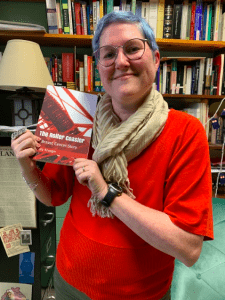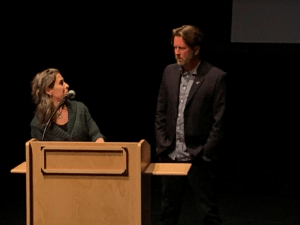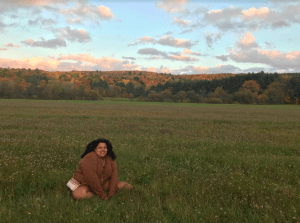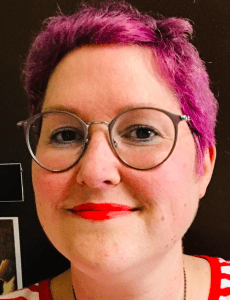
Nov 21, 2019 | Exclusive |
Faith Diaz Contributing Writer
Associate Professor of English, Misty Krueger, recently released her new memoir, “The Roller Coaster: A Breast Cancer Story.” Her collection traces her breast cancer journey in various pieces of prose, poetry, and essays.
The book was written over the course of Krueger’s discovery of her cancer, her diagnosis, appointments, surgery, and more. Different pieces of the text range in times of their creative origin, some having been written in real time as they were happening to her or as reflection after the events had passed.
“Roller Coaster,” according to Krueger, “traces a year in the life of a cancer patient, particularly someone with breast cancer and the treatment that she, I, received and how I dealt with that as a life changing experience.”
As the reader moves through the text, the story traces a linear timeline of Krueger’s life via realizations she has about her body. From being a young woman who did not consider the possibility of physical pieces of her body being removed, to an adult put into the place of having to make many quick decisions in order to save her life.

Misty Krueger with her self-published book, now available on Amazon (Photo courtesy of Faith Diaz)
“I follow that course through my decision to have or not have reconstruction, to have or not have chemotherapy, undergo radiation, to go on medical leave, and then the fall out of that whole experience combined,” Krueger said.
She described the mental toll that the experience took on her and the common misconceptions that the general public has about what it was like to live inside of a body that had cancer. “It is the whole person that is affected; its body, spirit, soul, mind, it’s everything.”
The story traces through all of these facets of Krueger as well as her teaching career at UMF. “I feel I would not have made it through this experience without the support from UMF,” she said.
When she was diagnosed in early 2018, a smaller group immediately took to showing Krueger how much they wanted to support and care for her throughout this difficult time in her life. She said, “People were reaching out to me and doing this in material ways like bringing me cookies, putting signs on my door, sending me cards, and also you know just telling me, ‘We’re here for you,’ ‘We love you,’ and ‘No matter what, you’re going to make it.’”
Krueger cites this positive energy, teaching, her family and more as being essential to her healing process. Her dedication to loyalty to these elements of her life were obvious in her pursuit to keep them close to her throughout her illness. “I knew that, that community would actually give me strength but, it turns out, my body was stronger than my will.”
As her illness progressed, Krueger grew weaker and against her usual ambitious nature, her teaching performance was affected. “I taught a month into the fall semester of 2018 and I just woke up one morning and knew I couldn’t do this to myself anymore or my students,“ Krueger said. “I wasn’t giving them the Misty Krueger experience.”
Through these series of realizations about what her illness meant for the other factors of her life, the UMF community stayed right by Krueger’s side even after she stopped teaching on campus. “I saw people from campus, they’d either come to me or I’d come here and mostly it was social media that really kept that community alive for me.“
Krueger heard from her friends, students and colleagues alike through social media like Facebook and Twitter. Even when she could not physically see her friends due to treatment they continuously made sure she got their message. “I just felt so loved. I felt excited to come back.”
That excitement stayed with Krueger as she survived her illness and began her recovery.
“It helped me get through radiation which I was going through as I was teaching and the transition to the drugs that I have to take for 10 years to stave off the cancer. Being here helped me get through that. I can’t tell you how grateful I am for everyone here,” Krueger said.
During her treatment and upon her arrival back into the UMF community in the spring of 2019, Krueger had been continuously writing about her experience with breast cancer, for which she found a wealth of support to publish her work.
Upon the book’s release, an education class utilized the text as part of an in-class analysis. On Nov. 6, Krueger visited class to talk about her experience and answer any questions that students may have had.
Students were intrigued by how Krueger could publish something that had detailed descriptions of her body and mind, and were awed at how she could be so vulnerable on the page. One student, Christine Destephen, asked, “How did you deal with putting the book out and exposing yourself?
Krueger said, “I will tell you my husband did not want me to write this book. He said, “This is too much, you are exposing yourself, You are going to let people read this? Especially strangers?’”

Misty Krueger’s self-published book, now available on Amazon
It was more than the idea of strangers reading her work that concerned Krueger’s husband. “Even worse for him was people we knew because he thought, ‘Strangers can read it, that’s whatever. The people you know, now they really know you, stuff about you they don’t want to know, are afraid to know, stuff that might traumatize them.’”
Krueger still wanted to write the book because she thought that in a way, that was exactly the point. “If we don’t talk about these things, if we keep all of this stuff a secret, then no one else will talk about it and we are all suffering alone,” she said.
As the class continued to ask their questions it was obvious that Krueger’s unique story was not only about her anymore, as she said, “It is about me and my story but there are other peoples’ lives that come into play because they are close to me.”
And with that closeness, for those that have since read her book, there are lives that have been affected and people that have found pieces of themselves within Krueger’s pages.
An unnamed student in the course had struggled with her own surgery and illness of a Cardiovascular variety and found Krueger’s description of coming out of surgery in this surreal wonder and uncomfortable state of surprisingly being alive, to be a spot-on representation of the experience. She ended her comment to Krueger simply with, “Thank you for writing this book.”
Krueger’s self-published book can be purchased on Amazon.
Nov 21, 2019 | News |
Kaitlynn Tarbox Contributing Writer
As students progress through their degree, many opt to move off campus to experience life on their own. But the big question is: where is the best place to live off campus?
There are two main housing companies around the Farmington area, one being Riverbend Properties and the other being Foothills Management. Riverbend owns 78 properties around the Farmington area, 71 of those being apartments, as well as five houses and two commercial spaces. They offer wifi, sewer, heat, hot water, water, and trash removal at most of their units. Each building also has coin-operated laundry on site and the only thing not included in rent is electricity. Their highest rent is $1700, but their lowest is $365 which is one furnished room.
Foothills Management is the other major company that rents to students. They have 128 apartments in the Farmington area. Included in their rent is electric, heating, WiFi, and parking/snow removal, and garbage.
Sharon Buker, sophomore elementary education major, currently rents from Riverbend her first off-campus apartment. She said, “It’s nice to have my own space. I can have friends over whenever I want and it’s a lot quieter than living in the dorms. Being able to have my cat is a huge bonus for me!”
The application process, Buker said is “really simple, I filled it out online with basic income information, what I was looking for number-of-bedrooms-wise, and whether or not I had pets. I received an email just a couple days later about going to look at an apartment.”
Jon Ferguson, a senior biology major, also rents from Riverbend Property Management. For Ferguson, the main perk of renting an apartment is having a kitchen all to himself. “I enjoy having my own place where I can cook my own food. I also enjoy where my apartment is located. I’m next to Stone and Dakin so I can still enjoy on-campus events.” Being close to campus can be beneficial to some students as they might not have a vehicle, so getting to classes is easier the closer you are to campus.
In the spring semester, UMF usually hosts a number of companies and landlords who table in the Student Center to tell students about off-campus housing options. “The application process was rather easy. I went in during the day that the campus puts on for off campus housing,” Ferguson said. “I got a tour of a couple of places and had signed the lease for my apartment by the end of it all.”
Charlotte Allard, a junior Outdoor Recreation Business Administration major, rents from Riverbend as well. She went through the same application process that Ferguson did, which was at the off-campus housing fair.
For some students such as Allard, on-campus living is not for them. Allard said, “ I didn’t really enjoy living in the dorms. I always felt kind of crammed in a room. I don’t feel crammed in a room with my apartment.”
The ability to have pets is a bonus for many students such as Buker and Allard. Allard said “I also enjoy the feeling of being independent, having my own place, and being able to live with my two cats.”
Buker said, “The owner of the apartment does a lot of the maintenance himself. There is a form on their website to put in a service request and the one time I needed to use it, he was here within half an hour to fix it.”
Faith Diaz, a senior creative writing major, has lived in three apartments owned by Foothills Management. She said, “I like the ability to come and go as I please without having to check in with a [CA]. I enjoy having my puppy, who is my ESA (Emotional Support Animal), but he has more room to live than if we were in the dorms. And I work so it’s nice to have my own space without interruption.” Foothills has a 25 pound limit on pets in their buildings.
The only issue Diaz has had is “the parking becomes an issue because we are so close to campus they confuse it for campus parking.” There are a few staff that work for maintenance on the buildings and Diaz said, “They are constantly working on all of the buildings and they are the real MVPs. But they are understaffed and the buildings are old and need more help being up kept.”

Nov 7, 2019 | Feature |
Faith Diaz Contributing Writer
Recently creative writing professors Jeffrey Thomson and Amy Neswald launched their joint project, “Blink”, a poetry film based on Thomson’s work from his new book, “Half Life: New and Selected Poems.” Thomson is currently the Creative Writing Director at UMF and works alongside Newswald, who has just secured the position of Associate Professor of Screenwriting and Creative Writing.
In September 2018, at the annual BFA staff reading, Thomson read and performed his poem, “Blink.” The poem follows a man whom has just had his head cut off. Legend suggests that the man, Antoine-Laurent de Lavoisier, suggested that his friend watch his execution and count as Lavoisier attempted to blink numerous times after the separation of the head from the body. Lavoisier wanted to see if they could record this phenomena and had hoped someone would following his death. In some way, his wish was fulfilled.
The legend found its way to Thomson, and his poem counts and describes what Thomson imagines Lavoisier saw in those seconds of death approaching, between the blinks, and after the head had been removed.

Amy Neswald and Jeffrey Thomson (Photo courtesy of Faith Diaz)
Upon seeing Thomson’s performance of this historically fascinating legend, Neswald immediately knew she wanted to utilize it in a film platform. “I was gobsmacked by it from the very first time I heard it. I approached him shortly after to ask him if he would be willing to sacrifice it to me for a short film.” Neswald said.
At the time, Neswald had just begun at UMF and was a bit hesitant, but the work dictated her need to pursue it, “Even though I didn’t know what it would look like, I knew it was a perfect piece to tell visually. It deals with what someone is seeing, as he’s dying, through these series of blinks. And [Thomson] said, ‘Yes.’ and that was that.”
Neswald’s background is in screenwriting and having spent years in the backstage of Broadway, poetry was a new avenue for her to be exploring. “One of the reasons I wanted to make a poetry film is because I am one of those horrible fiction writers who says constantly that I don’t understand poetry, I’m not a poet, and I thought this would be a really good way for me to get inside a poem and understand it from a vantage point that I could. To live inside a poem for a while. And I lived inside of it for a really long while.”
The process of figuring out what the aesthetic of the film was going to be was complicated and continuously changed. “I was aiming to make something very simple and stark,” Neswald said. “Originally I wanted to do a muslin background with a moving black thread [that would] kind of like sew different panels in a stop motion way.”
Neswald soon realized that the images weren’t coming out the way she intended so, she switched her tactic and stumbled upon an aesthetic she loved, based on the image of the text that stuck with her most. “Thinking about one section of the poem that’s really visual about clovers in a field and in looking at pictures of clovers and fields in France, I stumbled on an aesthetic that was far from my personal aesthetic. Which was super frightening but also kind of exciting.”
Neswald believes that even if a project is frightening, that one should pursue it anyway. This was a guiding philosophy that helped her keep up the motivation for this project.
“I built my pictures, my layers in photoshop, my puppets, decided what the moving parts would be and how to compose them,” Neswald said. “It was a collection of images from mostly the internet that I adjusted deeply and greatly that I used as a collage to create the scenery and puppets.”
Eventually, the project came together. “When I start a project, I am always a beginner because each project wants to be told in a different way, so, to be an absolute beginner and I have never made a poetry film, and I’ve animated before but I have never animated in this way,” Neswald said.
“And I’ve never worked on someone else’s work in a collaboration in this format and then to be working with someone who is kind of a big deal, I stepped outside of my comfort zone quite a lot on this project.”
In October of this year, Neswald flew to Cork, Ireland, where her film was Shortlisted for O’Bheal Award.

Oct 24, 2019 | Exclusive |
Faith Diaz Contributing Writer
Post-Doctoral Fellow in Digital and Public Humanities, Stephen Grandchamp, will teach ENG 377: Hip Hop History and Culture, for the Spring 2020 semester. The course is offered as an English and Music History Course and will be an examination of the history of the genre and a cultural analysis of the music and its effect on American history.
Grandchamp also intends to explore the genre’s evolution. “You might get more misogynistic party tracks in there but then you might get tracks in there from more female assertive rappers like going back to MC Light or Lauryn Hill, up to contemporary rappers like Nicki Minaj, Cardi B, Megan the Stallion, City Girls.”
He wants to clarify the cultural understanding of the genre as he said, “We’ll put all these different treatments of a theme side by side and talk about how they are relating and making connections and try to figure it out. Because Hip Hop is not monolithic in that it has one take on everything.” He continued, “I want students to be aware of some of those voices that have been marginalized.”
Students will also be exposed to the voice of a local underground rapper, Chris Brown, whose stage-name is Yung Breeze, and who is also the younger brother of Vanessa Brown, a UMF senior and TA for the course.
“I first talked about my brother and his music to Steve last semester during the New Commons course, and from there I sent some of his music along,” Brown said in messages. “Steve thought it’d be a great idea to talk about my brother as a local underground rapper and to have him be a part of the curriculum.”

Vanessa Brown, TA for the Course (Photo courtesy of Vanessa Brown)
“I thought it was awesome that [Grandchamp] brought that idea up,” she continued, “mainly because my family and music are so intertwined, and to watch and celebrate my brother’s hard work in an academic setting is an accomplishment in itself.”
The course is intended to breed further discussion on the cultural effects Hip Hop has had on the American society as a whole. “One of my main arguments about Hip Hop,” said Grandchamp, “is that you need to view it as a regional United States genre where in the local scenes of San Francisco, Los Angeles, Houston, New Orleans, Miami, Atlanta, Memphis, all of these different places have really vibrant hip hop scenes that have unique characteristics that differentiate them from all of the other ones.”
To better understand the unique principles and craft of each scene, students will create their own Spotify playlists based off of those scenes that will serve as a one to two hour premier for the general listener. Students will submit an essay alongside the playlist to explain why they chose these songs, the implications of those inclusions, and key themes.
The course’s main challenge lies in altering students perceptions of Hip Hop and its place in modern academia. “I would say it’s as controversial now as it’s ever been because of its willingness to take on taboo subjects in a really direct way, so race, class, gender, and politics. These are issues that are at the surface of Hip Hop music and we are not going to steer away from that,” Grandchamp said. “You have to get students to buy in to applying literary analysis processes to contemporary Hip Hop lyrics.”
Grandchamp is excited overall for the course. “If you take the class, be ready to listen enthusiastically. One of the main tasks of the course is just to get students to listen to the primary text which are the recordings of the genre to better understand it.”
Another goal of his is to prepare students to, “meet the music on its own terms. In that, Hip Hop is an art form that was birthed out of African American culture. So its is inextricably linked to African American culture. So I am going to ask students to meet that culture on its own terms. To try to confront it directly, analyze it directly, and really try to figure out where this artistic movement came from and whats the engine behind it.”
Brown hopes to aid students’ engagement with the music and culture by acting “not only as a sounding board for thoughts, ideas, and other things. . .during discussions and projects,” she said, “but also engage and share experience and/or my music insight from the hip-hop world.”
This course is now available for pre-registration on My Campus.

Oct 10, 2019 | News |
Faith Diaz Contributing Writer
Professor of English Misty Krueger will be offering a new English Honors course, HON 377: Proto-Science Fiction, this upcoming Spring 2020 semester. The course is an examination of British and American literary texts prior to the 20th-century and more importantly, before the label of science fiction was placed on these texts.
Students may be attracted to this course because, “you get to do things you wouldn’t do in another class, that’s one thing. Texts come together that don’t normally come together,” Krueger said. “Like you don’t normally read Shakespeare’s “The Tempest”, alongside Margaret Cavendish’s “Blazing World” or Jonathan Swift’s “Gulliver’s Travel”s or “The Strange Adventures of Doctor Jekyll and Mr. Hyde”. . .that’s interesting because they are across centuries.”
Krueger continued, “The other thing is that you get to read something that maybe you actually have read but from a new point of view or a new genre to you. So there will be students that have said, ‘Yeah, I’ve read Shakespeare.’ And I ask, ‘Well, have you read Shakespeare as sci-fi?’”
Krueger describes the way we differentiate each piece of literature into categories and how those categories are not as set as scholars thought. “If we take canonical text that we say is highbrow ‘literature’ and we put the lenses of scifi to it, then I think sci-fi is also raised up. . . because of the way we are thinking about the class,” she said. “So it raises that stuff up but it also brings the high stuff, like Shakespeare, down. Because it’s like Shakespeare, he’s not up there anymore, he’s just down here with everyone else.”
Kruegers’ aim is to teach students how these genres that we thought were so distinctly different, as scholars, actually have an immense overlap. Having taught this course once before, in the Spring of 2017, as a request to bring in a new Honors course and after approval by the Honors Director, then Eric Brown, Krueger is excited and prepared.

Misty Krueger (Photo Courtesy of Misty Krueger)
The emphasis on the blending of genres is carried out throughout the course to what will be, the students final project. “The final examine is not a paper, it’s not a project, it’s a game. So that’s what we did. So we spent a month creating a game and everyone in the class worked on it. Its an entire class project,” said Krueger.
Each piece of the project was individually created and produced by a student, each working on a separate entity of the game to bring it all together in a playable fashion. “Some people wrote the narrative, some people designed the pieces we played with, some people did the art for the project, some people created the booklet that would come in the game,” said Krueger, “It was like a D&D game.”
With this game as a final project, “The most important part is that we get to create our own world, with the game, and each of these texts are creating their own worlds, which is a basic tenant of sci-fi,” said Krueger. This project allows for students to replicate the creative mental process that is happening on paper into a tangible and playable object.
“What’s important is that they learn how to work together, students, in that they can create a game out of our course materials and they have fun. We will play the game and announce the dates and times to the university,” Krueger said.
This course is now available in time for pre-registration on My Campus.




